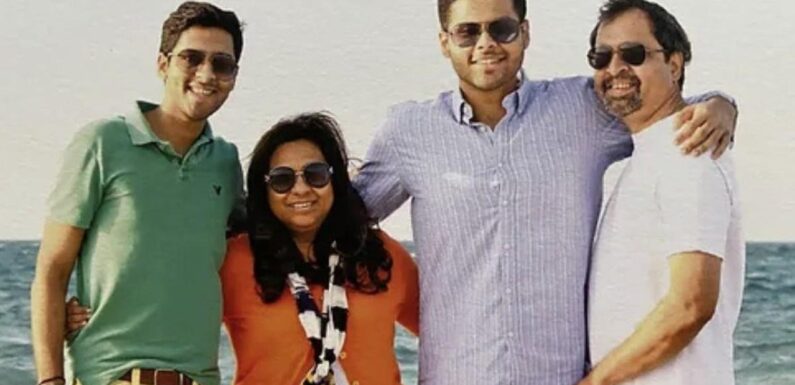
As parents, we all worry about our children – even when they’ve moved out to start their own lives.
So, when my 25-year-old son Rudy called me at 8.30am one morning back in February 2013 to chat, I knew something was wrong.
He had a solid routine at the gym, but was struggling to use the step master, and couldn’t lift the same weights with his right hand as he could with his left.
Rudy mentioned his symptoms almost casually and told me that I shouldn’t overreact.
My heart sank to my toes and I tried hard to let him not hear the panic I was feeling. I knew something must be wrong.
But never did it cross my mind that this was the beginning of the end.
He’d just spent Christmas with me, my husband Som and his younger brother Arjun, and thought he’d lost strength because of the holiday break.
I told myself not to be concerned.
Rudy was a strapping young lad in his mid-twenties - at 6’4, he’d always been healthy and fit.
But by the first week of February, he started to feel a little drag in his right leg. After visits to his GP and then a neurologist, he was admitted to the Queen’s Medical Centre in Nottingham – as that’s where Rudy lived at the time – where he underwent extensive neurological tests that all came back negative.
By now, our boy had started to noticeably slow down. Something was wrong, we just didn’t know what.
We moved him to the National Hospital for Neurology and Neurosurgery – it was near our home in North London, so I could cook for and look after him. By this time he had to be supported as he walked and bathed.
His vision was getting poorer – he was passionate about Formula 1 and was distraught that he would not be able to watch it on TV.
After spending a month undergoing more tests, we were given the devastating news that Rudy had a rare brain cancer called Gliomatosis Cerebri.
We had never heard of it, but soon became experts in this terrible disease.
We learnt that this rare, aggressive type of brain cancer grows and spreads rapidly and often becomes resistant to treatments.
It does not manifest itself as a lump, but instead is like a spider’s web of cancer threads that spread deep into the brain, making it almost impossible to remove surgically, and difficult to treat with radiation.
There was nothing that could offer a way to slow or stop it.
Eighteen weeks after Rudy noticed his first symptom, and just a few days after we were told of his diagnosis, he slipped into unconsciousness.
He left us nine days later, on the morning of June 4 - his 26th birthday.
It’s been 10 long years since that day, and even now there’s a part of me that still hopes there will be a knock on the door, and he’ll walk through it.
But we had a choice to make very early after Rudy left. Would our remembering of him on his birthday be a celebration, or would it be a day of mourning?
We chose to celebrate him.
The first ‘Remembering Rudy Walk’ took place on June 8 2014, the closest Sunday to Rudy’s birthday. The route started near Westminster Bridge and ended at Tower Bridge.
The Rudy A Menon Foundation, as it became known, was still in its early stages. Donations were collected on the walk and forwarded directly to The Institute of Cancer Research, London, to support Professor Chris Jones and his team’s research into Gliomatosis Cerebri.
No state funding is allocated to conduct research on these diseases, and no family should have to lose a loved one for lack of research.
So far we have raised more than £400,000 towards research into brain tumours in children and young adults.
This includes support for two PhD students at The Institute of Cancer Research who are dedicated to improving the outlook for patients with Gliomatosis Cerebri.
The students use technology to analyse tumours at the single cell level – including the different types of non-cancer cells that make up and support these tumours.
By discovering how tumour cells and supporting cells interact, the researchers can potentially develop new treatments - to help give someone like Rudy another chance at life.
And every other year, in September, we join with organisations across the globe and sponsor at a conference to create awareness as well as draw attention to the lack of research on Gliomatosis Cerebri and other inoperable brain cancers. It’s a dedicated time for researchers and clinicians to discuss the future.
Losing Rudy pushed me to the brink of darkness, where life had lost its meaning and panic attacks were common occurrences. I also felt a strong sense of guilt living on after him.
As a family we struggled, yet we tried not to let our grief affect Arjun, Rudy’s younger brother more than it already was.
My husband and I do not celebrate Christmas at home anymore, but now for Arjun and his wife Rosie we want to make that effort and this Christmas, 10 years on, will be the first time we will all be together.
It will feel hard as it was Rudy’s and the family’s favourite celebration.
The pain of losing a child, a sibling and a friend is something we know, and we know what that pain does to a family.
If we can help even one family, if we can save one child like Rudy, it will all have been for something - that’s our mission now.
Do you have a story you’d like to share? Get in touch by emailing [email protected].
Share your views in the comments below.
Source: Read Full Article

